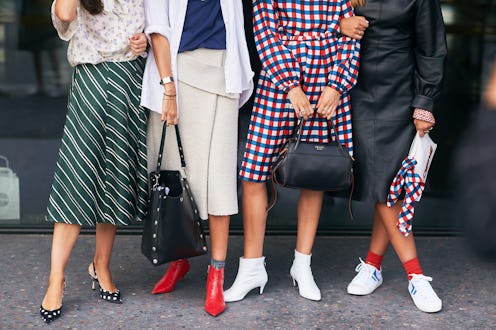For as long as I can remember, my dad has said to me, "You need to gain weight. Guys don't like skinny women." Ouch.
Above image, Getty Images; Full-Bleed image, Adam Katz Siding; Lead Image, IMAXtree
I've always been thin, save for a few years in college when beer and 3am Del Taco were the only two food groups I consumed. But a few years ago, my body changed and I became even thinner than before. I've ascribed this change to hormones, age and antidepressants, since I've had my doctors run multiple tests, all of which have returned normal. I'm not complaining about unexplained weight loss that seems completely unaffected by what or how much I eat. That would make me a jerk. Still, gone are my C-cup boobs, replaced by what I call "negative As," which can be held in place by extra-small bralettes from Forever 21. Besides, it's not like I suddenly look like a supermodel. I am instead what I call "skinny fat." It's hard for me to acquire tone. My belly has rolls, even as I weigh 104 pounds. I've got cellulite and all kinds of jiggles, including loose skin and stretch marks where I used to be more filled out.
"Like most women, I feel bad about the shape of my body, over which I have very little control."
What's more, the aesthetic of the day is Kardashian, which means all curves. I love this look. Love, love, love it, and am—as someone who had an eating disorder in high school—incredibly happy the goal aesthetic is no longer heroin-chic skinny. That said, it’s completely unattainable for me. If I gain weight, it goes only to my stomach and my cheeks. My last boyfriend bemoaned my skinny frame, imploring me to eat more in order to gain some curves. "Unless you're into a flat-chested, chipmunk-cheeked pregnant-woman vibe," I'd respond, "cheeseburgers aren't going to turn me into the girl of your dreams."
So, just like most other women on the planet, I feel bad about my body, over which I have very little control. In 2017, I want to look like Kim K or Caroline Vreeland. I remember seeing this Instagram post on Caroline's feed a while back and feeling absolutely awful about myself. The photo is of a woman alleged to be Time magazine's 1955 definition of a perfect body. She is perfect, and she has curves for days. The caption reads, "Way sexier," which is awesome positive reinforcement for girls with curves. But why do we have to choose one or the other? Why do we have to say if this is pretty, the other is not? Can't we just say one is sexy and the other is too?
A popular, well-intentioned internet meme which actually includes an image of adult film star Aria Giovanni that was taken in 2004.
When I hear things like, "Real men love curves, only dogs go for bones," it hurts my feelings. I'm sure reading that makes women who've fought to love their curves roll their eyes, but it's my experience. When I went from a sizable chest to no chest at all, I realized how connected those curves were to my definition of womanhood. I find myself buying into the "this is greater than that" mentality, even as I don't agree with it. I think Caroline Vreeland is sexier than me. I will never have curves like hers. And I'm not picking on Caroline—in fact, she's a friend of mine—nor am I attacking her for her post, which was intended to build up not bring down. She's not the only one, by any stretch, who unintentionally negs those of us on the skinny end of the spectrum in the name of body positivity. Meghan Trainor's hit "All About The Bass" is an awesome anthem for the bootylicious, but I'm not sure it needed this line in order to get its point across: "I'm bringing booty back. Go ahead and tell them skinny bitches." Nicki Minaj's "Anaconda" is likewise a fave, but it also pits one body type against the other. "F*ck the skinny bitches!" she sings. "F*ck the skinny bitches in the club!"
"As a woman who was anorexic in high school and overweight in college, I understand that how we feel about our bodies in this society is complicated."
When deciding whether or not to write this, I spent some time on the internet reading articles about how skinny-shaming is not a thing, and how I should probably just shut up. Maybe I should. I understand as a woman who was anorexic in high school and overweight in college that how we feel about our bodies in this society is complicated. I got more compliments for being sickly skinny than I did for being a bit over my natural weight, if you exempt my dad. (Keep in mind this was the late '90s, when Kate Moss was the desired sex icon of the day.)
Still, I don't see why we need to pit one aesthetic against the other. Some people are naturally thin. Some have breasts or booties that would make J.Lo proud. Most of us fall somewhere in between or outside these ideals, with pudgy tummies, boobs that don't hang like they used to and backsides not as high or round as the Kardashians'. We’re not going to fix the problems that come with society's arbitrary assignation of an ideal body type—which changes every decade—until there are no more ideals. How can we expect men to stop comparing and contrasting our physical attributes if we don't do it first? To be truly feminist—and, you know, kind—we need to work harder to abstain from us-versus-them dialogue that bolsters one by diminishing the other. Feeling body positive is an amazing—and often impossible-seeming—accomplishment in 2017. Let's do everything we can to get ourselves (and one another) there and not waste our lives hating who we are.
